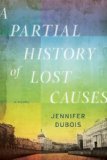Page 2 of 4
There are currently 23 member reviews
for A Partial History of Lost Causes
-
Beverly K. (Lockport, IL)
A Partial History of Lost Causes
I’m a sucker for books that explore why we do the things we do and A Partial History of Lost Causes is a beautiful first novel that has two very different characters searching for love and meaning and the answer to their own “lost causes”. How Irina Ellison, an English lecturer from Cambridge, MA who believes she will develop Huntington’s disease and Aleksandr Bezetov, a Soviet chess champion turned political activist meet and interact is brought to life by Ms. DuBois with laughter and tears.
I learned quite a bit about Russia’s post-Communist era, not particularly something I thought I would enjoy, but I did. This isn't the type of book you idly pick up and skim through. You become engrossed and enchanted not only by the story, but also by the author's lyrical descriptions of Russia--harsh and beautiful.
-
Julie M. (St. Paul, MN)
Nothing to Lose
The book examines how unlimiting knowing you have nothing to lose can be. An entertaining speculative look at Russian history, the game of chess and death and dying. The question I kept asking myself was what would I do with my life if I knew it would end at the age of thirty?
-
Suzanne G. (Tucson, AZ)
Fate
This is a great book. The time frame of the story is 1979 through 2007. Two main characters meet in Russia in 2006; Irina finds Aleksandr, a former chess champion who she hopes has answers for her questions regarding the outcome of fate. Irina was in first person while Aleksandr’s story was told by the author—definitely a change of style that I enjoyed. I’m anxiously looking forward to reading the next novel of Jennifer duBois.
-
Patricia S. (New Canaan, CT)
Would appeal to chess players
Had my parents not taught me to read a book through to the end, I might have stopped midway and given this barely a 3. I found it very tedious in the beginning and wished I knew something about the game of chess. However as the book progressed, it began to have more rhythm, and I enjoyed the writing style and Ms. DuBois' command of the English language. The last 1/3 of the book was a pleasure to read, and I was then wishing for more.
-
Beatrice D. (Floral Park, New York)
Searching for Meaning in Different Worlds
Two characters from opposite sides of the world meet in a country that is frequently in the news, yet we know so little about the life of its people.
Aleksandr, a chess prodigy from a rural village in Russia finds himself first in Leningrad where he meets people who have an influence on his life and then in Moscow.
Irina, from Cambridge, Mass., has cut all ties with her American life and is now in Moscow seeking to meet Aleksandr because of a letter she found among her late father's papers. Both are searching for answers to the meanings of their very disparate lives.
The subsidiary characters (both real and fictional), as well as the events described during this period in Russia's history make for an engaging and provocative read.
-
Amber B. (East Sparta, OH)
Intelligent & Thoughtful Debut!
As someone who has visited Eastern Europe several times, I was particularly interested in this story. While not particularly an "easy" read (it took me a little bit to get into it) - it was definitely worth it. Intelligent and intriguing, I hope to read more by Jennifer DuBois.
-
Elizabeth L. (Salem, Oregon)
Slow Going
Perhaps it was the short days and ensuing light deprivation (like Russia!), but I had a very hard time finishing this book. The main problem is that the two major characters do not meet until 200 pages in and even then they exist in parallel more than together. And they are both are very depressed. But I would say that - apart for some editing mistakes that will hopefully be corrected - the writing itself is very good.
